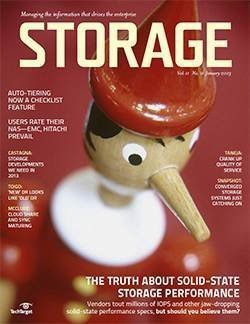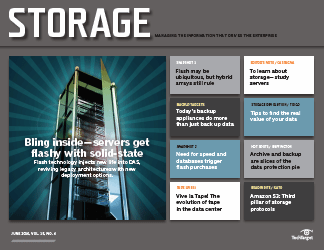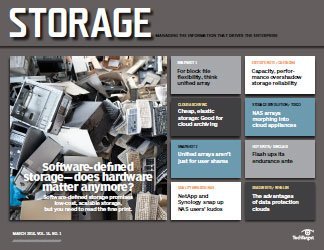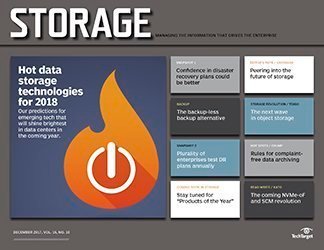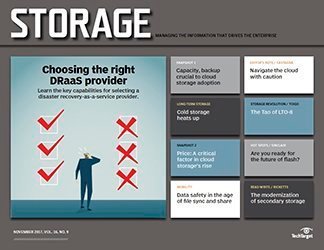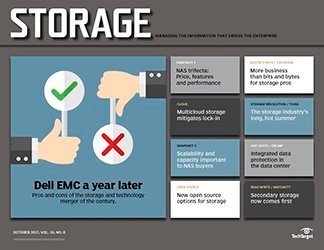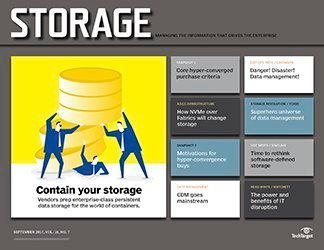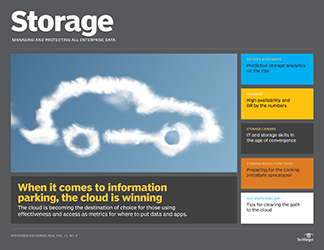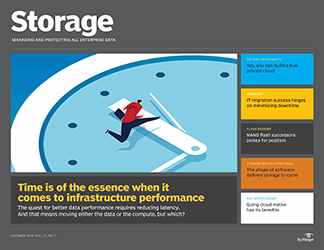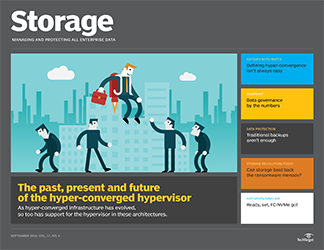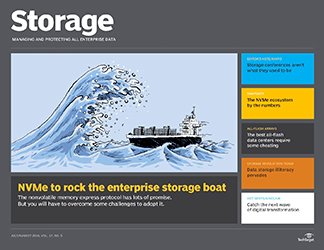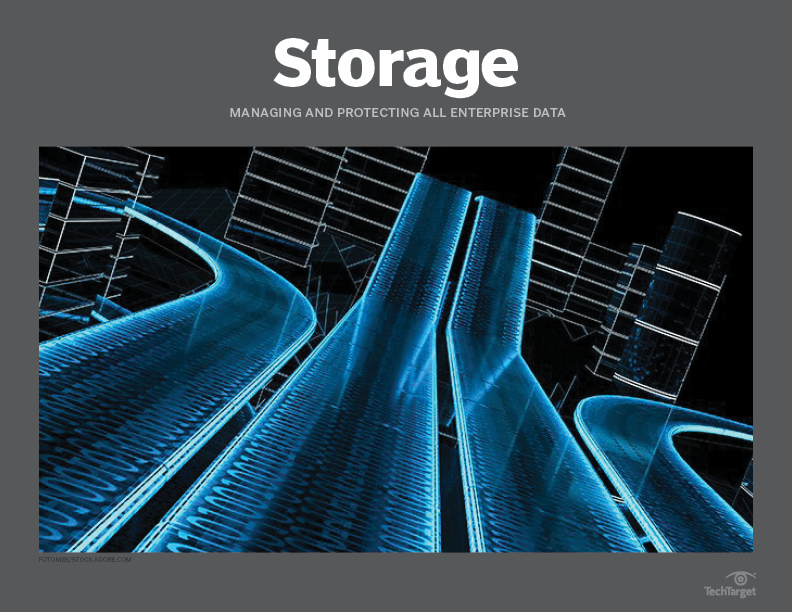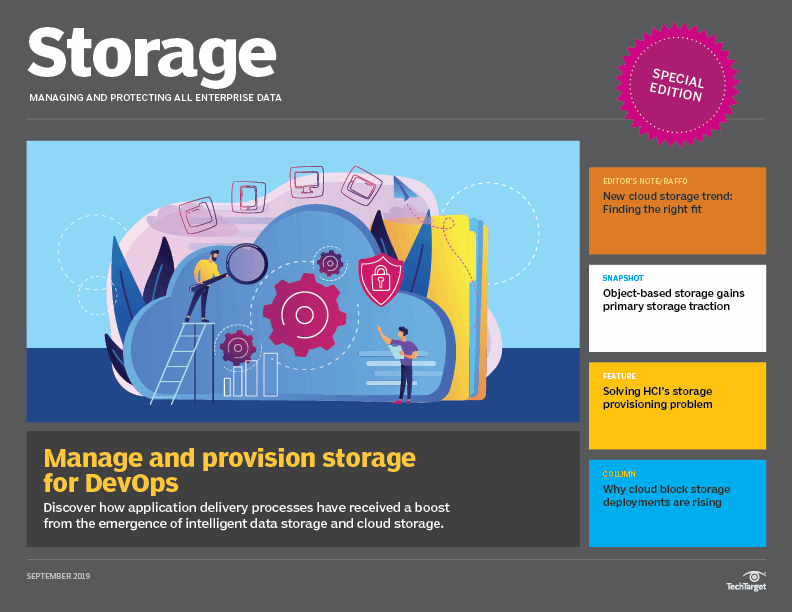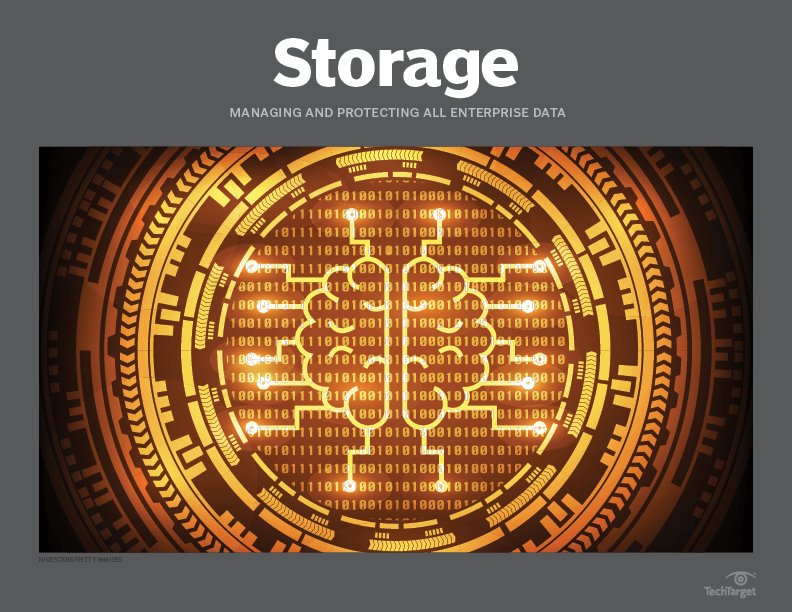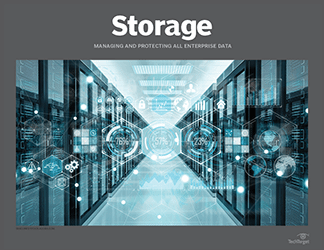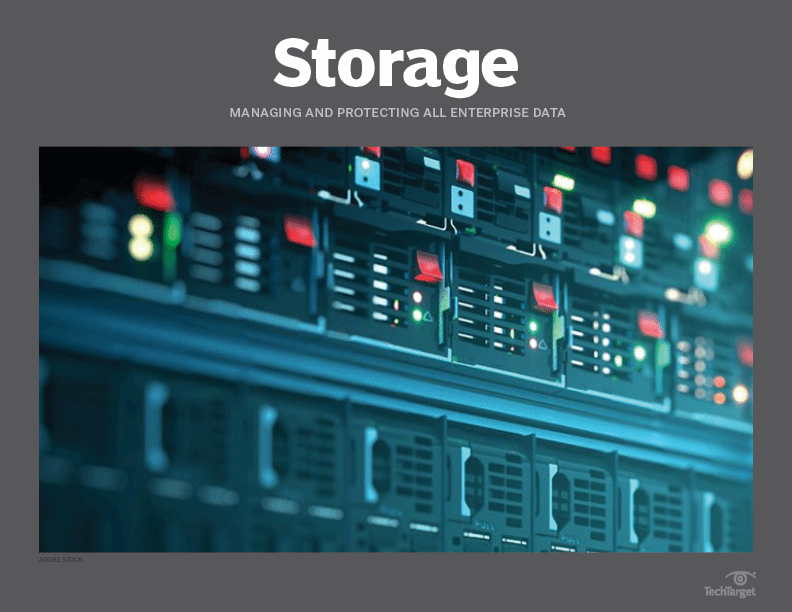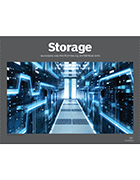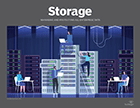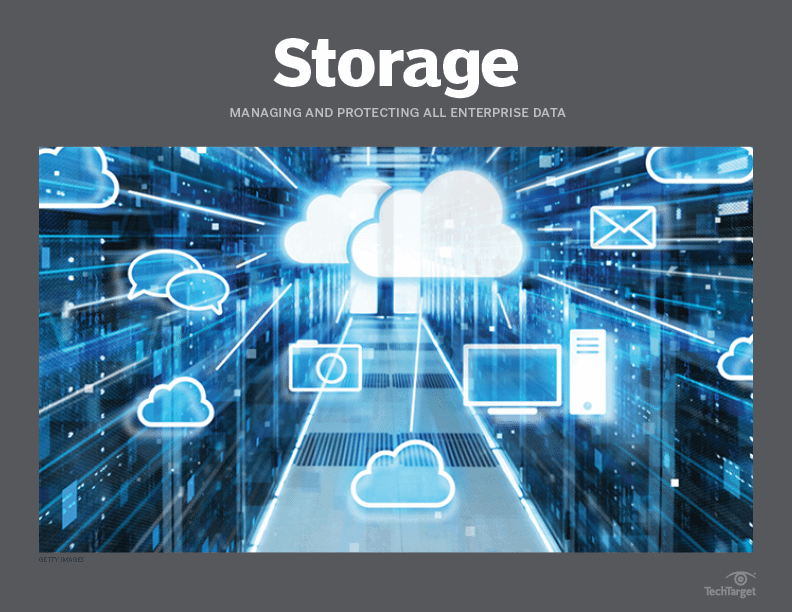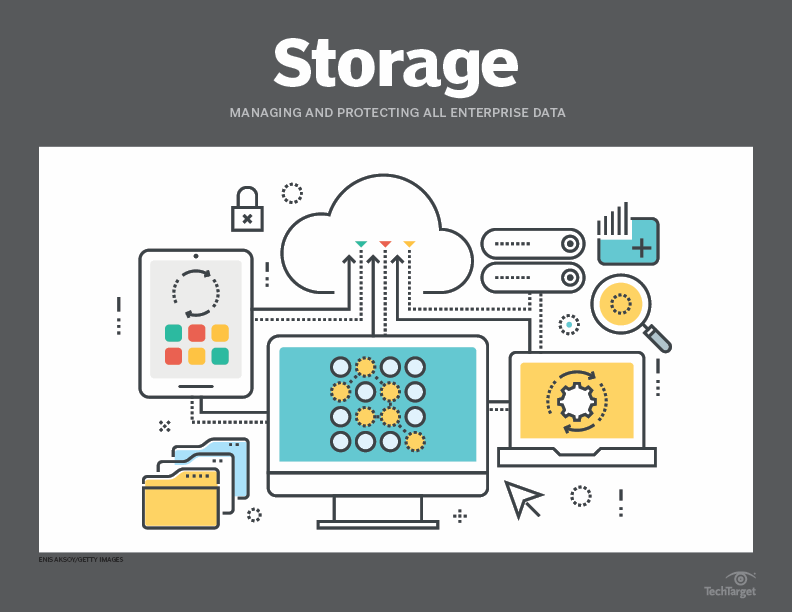Storage
- Editor's letterThese 5 IT buzzwords for 2021 reflect data storage priorities
- Cover storyThe best enterprise storage systems and products of 2020
- InfographicEfficient data storage tips to achieve a green data center
- FeatureEnterprise technology trends for 2021 shaped by COVID-19
- ColumnPay-per-use pricing model can boost digital initiatives
- ColumnCost-effective snapshot management tips and strategies

The best enterprise storage systems and products of 2020
Nearly 100 products and services competed for top honors in the 'Storage' magazine and SearchStorage annual Products of the Year awards. Find out which won gold, silver and bronze.
The year 2020 was a difficult one and unlike any other for businesses and organizations around the world. Fortunately, while the challenges presented by COVID-19 were numerous, many data storage vendors rose to the occasion with standout enterprise storage systems, software and services.
The 19th annual Storage magazine and SearchStorage 2020 Products of the Year competition recognizes the best of these products.
We invited vendors to submit their products for consideration last fall. To be eligible, products must have been initially released or significantly upgraded on or after Sept. 20, 2019, and before Sept. 21, 2020. Our panel of industry experts -- consultants, analysts, and Storage magazine and SearchStorage editors and writers -- then selected 47 finalists to compete for medals in each of five categories: backup and disaster recovery (DR) hardware, software and services; cloud storage; disk and disk subsystems; hyper-converged and composable infrastructures; and storage system and application software.
Our judges rated each finalist product on several factors -- including technological innovation, ease of integration, ease of use and manageability, functionality and value -- to determine our winners.
Our results included multiple repeat gold winners (Vast Data, LucidLink and WekaIO) for the first time ever. Furthermore, no enterprise storage product or service has won gold in consecutive years since 2002 and 2003 -- the initial two years of the storage Products of the Year -- when Commvault won for backup and DR software.
This is quite a notable achievement by these three vendors, but it shouldn't take away from the other competition victors. Explore all the 2020 gold, silver and bronze enterprise storage systems and products winners below, as well as an impressive startup that didn't make the podium but garnered our second annual Judges' Choice award.
Earning a spot as a finalist isn't easy; winning a medal is even harder. Kudos to all our medalists. Your recognition as some of the best the data storage industry had to offer in 2020 is well deserved.
Backup and DR hardware, software and services
Protecting containers and getting the most out of data are important data protection trends winners in the backup and DR category underscored. Gold and bronze recipients Kasten Inc. and Portworx Inc. reflect the former development, while silver medalist Rubrik Inc. exemplifies the latter.
Purpose built for Kubernetes, gold winner Kasten K10 v2.5 is a comprehensive container data management platform that provides backup and recovery for Kubernetes deployments and workloads. The latest version includes a cloud-native transformation framework with mobility and backup enhancements. It also offers automation and the ability to migrate applications on premises and across public clouds.
Cloud data management and backup vendor Rubrik earned silver with its new Polaris Sonar product, which blurs the line between backup, compliance and security to enable users to discover and report on sensitive data without disturbing production environments. Built on Rubrik's SaaS platform, Polaris Sonar goes beyond standard backup and recovery by using machine learning and analytics to improve security and data governance, compliance, recovery and agility in the age of regulations like GDPR.
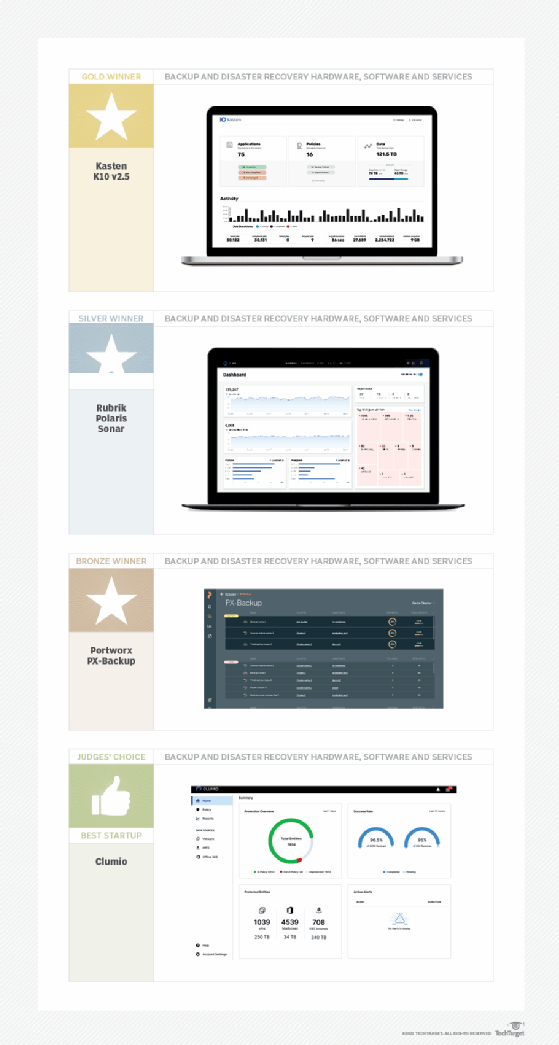
Portworx's PX-Backup garnered bronze in this category. A new product from the container management vendor, PX-Backup enables organizations to back up to any S3-compatible storage for storage and then recover them in single or multiple clouds or data centers. In addition to container data lifecycle management, features include the ability to easily restore full Kubernetes applications, catalog relevant metadata and enrich visibility of data access.
Up-and-comer Clumio earned our second annual Judges' Choice award as best startup with its ambitious goal of doing for backup what Salesforce has done for CRM. Clumio said its product features air-gap protection, rapid recovery and restore flexibility when protecting VMware Cloud and vSphere, Microsoft 365 and major Amazon public cloud services, including Elastic Compute Cloud, Elastic Block Store and Relational Database Service. Note: Last year's inaugural Judges' Choice winner, Cloud Daddy Inc., also sprang from the backup and DR category.
Learn more about our 2020 backup and DR hardware, software and services winners.
Cloud storage
The pandemic accelerated the adoption of cloud storage in 2020, perhaps more than any other storage Products of the Year category. This year's winners address three areas -- cloud-native application management, cloud NAS and hosted cloud -- of using the cloud as a storage tool. The diversity among the winners reflects enterprises' growing comfort with storing data in the cloud as they re-evaluate their IT infrastructures at a time when working from home has become the norm.
Four-year old NAS vendor LucidLink Corp. once again captured category gold, this time with v1.24 of its Filespaces SaaS file system, which added support for Microsoft Azure after having already supported Amazon and Google. Filespaces also supports object storage vendors like Cloudian and Scality. As a shared global namespace, Filespaces works like a standard NAS but reduces latency as primary file data is hosted in the public cloud. Compliance and data protection features include user access control, immutable snapshots and global file locking.
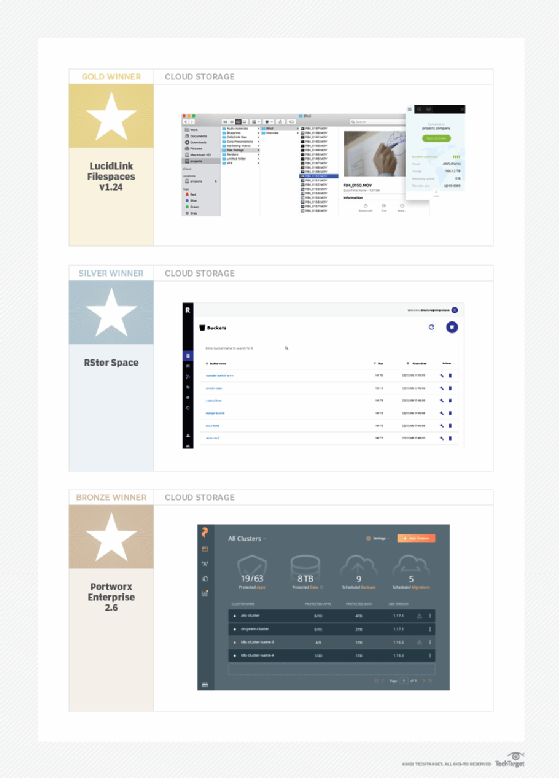
Silver winner RStor Inc.'s Space object storage comes with the vendor's on-premises and cloud-based PaaS. Space uses AI-based data analytics to replicate and store data in the most efficient place in RStor's cloud. It can also shift objects among dispersed points of presence for data protection purposes and connect data to a variety of public clouds, including AWS, Azure and Google.
Third-place finisher Portworx won bronze for Kubernetes application storage and protection in its Portworx Enterprise 2.6. This version comprises a number of components -- PX-Store, PX-Secure, PX-Migrate, PX-DR, PX-Backup and PX-Autopilot. It also has several enhancements, including node capacity rebalancing, granting Kubernetes application pods access to external data sources like NFS shares, support for lightweight Kubernetes K3 distribution for edge environments and operating Portworx storage clusters even when Kubernetes etcd key-value store is temporarily disrupted.
Discover more about our 2020 cloud storage winners.
Disk and disk subsystems
Medalists in the disk and disk subsystems category demonstrate how integral flash has become to enterprise storage systems and arrays. As solid-state prices continue to fall, it has become easier for both large and -- increasingly -- midsize organizations to replace disk-based storage with flash media. This category includes the second of three repeat gold winners for storage Products of the Year 2020, as well as a new midrange array and the addition of NVMe-over-TCP flash fabric to the hybrid architecture of an enterprise storage system.
Vast Data Inc. scored gold last year for its Universal Storage v2.0 enterprise storage system. This year it stands atop the podium for its LightSpeed NAS appliance, which expands the disaggregated Universal Storage platform into pooled flash storage for primary and secondary data. The innovative storage architecture of LightSpeed unites NVMe flash, Intel Optane persistent memory and quad-level cell NAND SSDs in one product. For high-performance computing, Vast Data said LightSpeed delivers twice the performance of the company's earlier hardware.
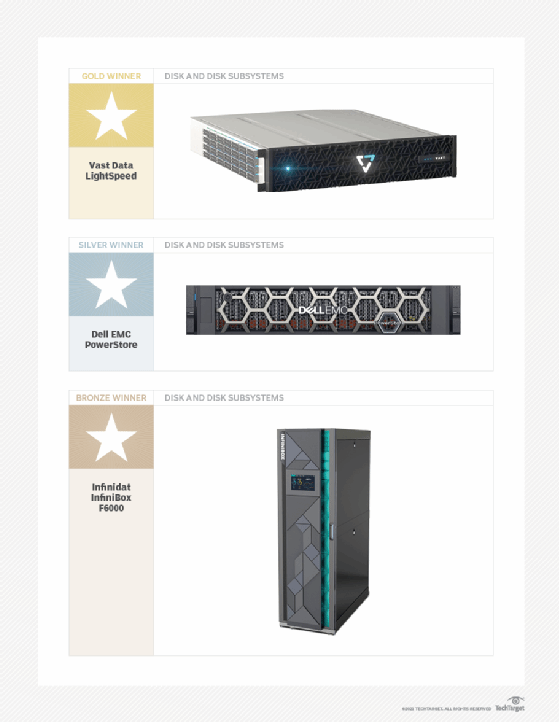
Dell EMC PowerStore, a midrange enterprise storage array, garnered silver with end-to-end NVMe flash and support for Intel Optane dual-port SSDs and storage class memory cards. The new scale-out and scale-up system delivers three-times lower latency and sevenfold the performance of Dell EMC's previous flagship midrange system, Dell EMC Unity. PowerStore also supports virtualized storage management with VMware Virtual Volumes as well as block and file data. A wizard eases data migration from other Dell EMC enterprise storage systems.
Targeted at those requiring petabytes of data storage but without an all-flash budget, Infinidat Inc.'s InfiniBox F6000 enterprise storage array scored bronze with system enhancements that include native NVMe fabric support, elastic pricing and redundant replication. The F6000 can scale to 4.1 PB of usable capacity. Flash accounts for just 3% of total InfiniBox capacity and is used to accelerate back-end access to cold disk-based storage.
Get more information on our 2020 disk and disk subsystems winners.
Hyper-converged and composable infrastructures
Hyper-converged infrastructure's early strengths in VDI served organizations well when most of their employees had to start working from home because of COVID-19. Of course, the infrastructure paradigm has expanded its use cases quite a bit over the years. This is reflected in the winners of the hyper-converged and composable infrastructures category, which address the varying needs of environments and advanced workloads.
As the name notes, gold winner Dell EMC VxRail E Series with Intel Optane persistent memory uses the latest in storage class memory -- PMem in App Direct Mode -- to act as a storage cache and provide exceptional storage performance like accelerated database logging. VxRail E Series delivers this power in a compact package suitable for edge deployments at great value and with the ability to support a variety of workloads. Jointly engineered with VMware, the hyper-converged system is deeply integrated with VMware vSAN, the leading hyper-converged infrastructure software on the market.
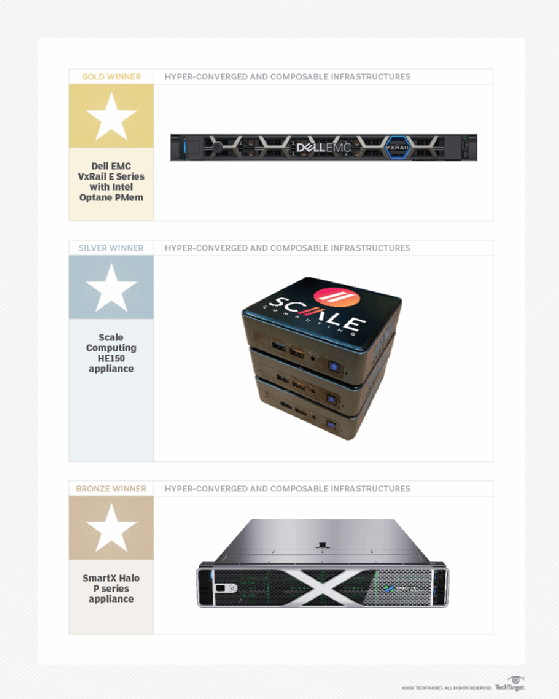
Scale Computing's HE150 appliance earned silver for being, among other things, one of the first fully functional hyper-converged systems to use Intel's small form factor, four-by-four inch Next Unit of Computing (NUC) mini-computer. About the size of an Apple TV set-top box, the HE150 doesn't skimp on features even at such an edge-friendly size. Additional features include remote and fleet management capabilities, as well as machine learning to detect infrastructure issues.
A "performance beast," bronze winner SmartX Inc.'s Halo P series appliance targets high-end workloads, such as machine learning development and financial transactions. The Halo P series delivers a lot of bang for the buck, such as a terabyte of PMem, 192 GB RAM, 12.8 TB of NVMe and a pair of 100 GbE network interface cards. Like the VxRail E Series, its Optane memory can run in App Direct Mode. Also noteworthy are its high VM density support, less than 100 microsecond latency, 1.2 million IOPS, remote direct memory access over Converged Ethernet networking and extremely high throughput 25 GB sequential bandwidth.
Read more about our 2020 hyper-converged and composable infrastructures winners.
Storage system and application software
Medalists in the storage system and application software category focused on the cloud and Kubernetes container support in 2020. While all the winners use the cloud in some manner and can handle storage across multiple cloud and on-premises platforms, each has a unique focus: high-performance parallel file storage, Kubernetes data management and multi-cloud data migration and management. As with other storage Products of the Year categories, the COVID-19 pandemic accelerated trends -- in this case Kubernetes and cloud migration -- already in the offing.
A high-performance parallel file system running in AWS, repeat winner WekaIO WekaFS stands tall atop the podium with numerous notable enhancements in version 3.8. These include validated AWS Outposts support, a Kubernetes Container Storage Interface plugin and snapshotting to S3 object storage. Another new feature, called Weka AI, includes SDKs and a customizable reference architecture framework for the high-ingest requirements of AI and other I/O-intensive workloads to speed up AI data pipelines.
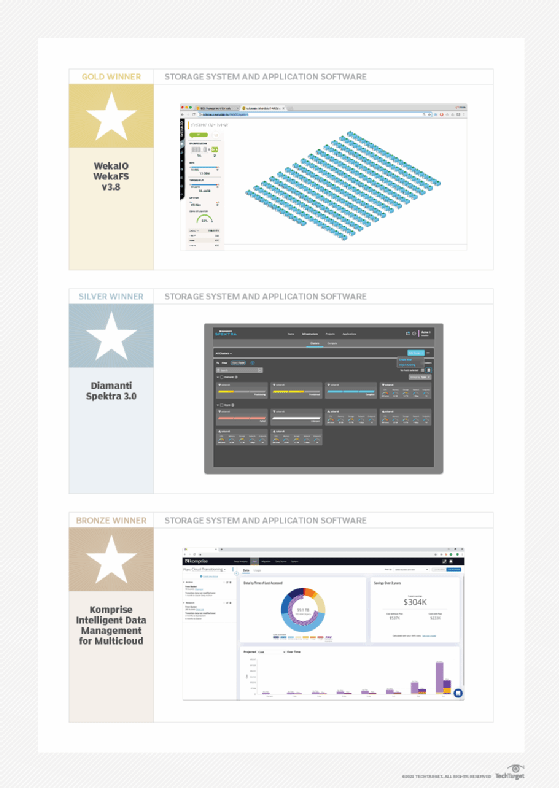
Second-place winner Diamanti Spektra 3.0 is a data management platform and control plane for Kubernetes applications and data. The latest edition extends these capabilities, along with customizable replication policies for data protection, to multiple Kubernetes clusters and on-premises and cloud environments through a unified console to deploy, manage and migrate workloads. It also adds multi-tenancy features to limit individual access, isolate tenants and provide more granular visibility.
Bronze winner Komprise Intelligent Data Management for Multicloud is a management platform for analyzing, migrating and replicating data regardless of whether it's stored on premises or in the public cloud. Analytics include cost projection to help plan storage strategies, while expanded coverage adds support for cloud NAS -- such as Azure Files, NetApp Cloud Volumes Ontap, Amazon Glacier, S3-compatible cloud object storage and AWS Elastic File System. Intelligent archiving and retrieval rules further aim to optimize the cost of storing data and nondisruptively moving data.
Read more about our 2020 storage system and application software winners.
Next Steps
Dig Deeper on Storage management and analytics
-
![]()
Container storage platforms: Big six approach starts to align
By: Antony Adshead
-
![]()
Pure aims at near bare metal I/O with Portworx PX-Fast
By: Antony Adshead
-
![]()
Kubernetes data protection heavy on automation, integration
By: Paul Crocetti
-
![]()
Portworx adds anti-ransomware to PX-Backup for Kubernetes
By: Antony Adshead





